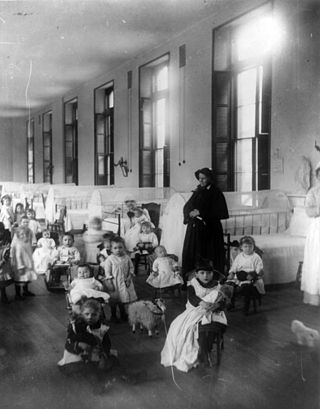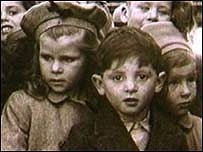Related Research Articles
Incest is human sexual activity between family members or close relatives. This typically includes sexual activity between people in consanguinity, and sometimes those related by affinity, adoption, or lineage. It is strictly forbidden and considered immoral in most societies, and can lead to an increased risk of genetic disorders in children.

Married... with Children is an American television sitcom created by Michael G. Moye and Ron Leavitt for Fox. Originally broadcast from April 5, 1987, to June 9, 1997, it is the longest-lasting live-action sitcom that aired on Fox. Married... with Children was the first series to be broadcast in the primetime slot of the then-new fourth network, Fox. In addition to the show's original run, one episode that was not aired after filming on January 6, 1989, was aired on FX on June 18, 2002, five years after the series' conclusion.

Adoption is a process whereby a person assumes the parenting of another, usually a child, from that person's biological or legal parent or parents. Legal adoptions permanently transfer all rights and responsibilities, along with filiation, from the biological parents to the adoptive parents.

The term one-child policy refers to a population planning initiative in China implemented between 1980 and 2015 to curb the country's population growth by restricting many families to a single child. That initiative was part of a much broader effort to control population growth that began in 1970 and ended in 2021, a half century program that included minimum ages at marriage and childbearing, two-child limits for many couples, minimum time intervals between births, heavy surveillance, and stiff fines for non-compliance. The program had wide-ranging social, cultural, economic, and demographic effects, although the contribution of one-child restrictions to the broader program has been the subject of controversy.

In some cultures, a surname, family name, or last name is the portion of one's personal name that indicates one's family, tribe or community.

A boarding school is a school where pupils live within premises while being given formal instruction. The word "boarding" is used in the sense of "room and board", i.e. lodging and meals. As they have existed for many centuries, and now extend across many countries, their functioning, codes of conduct and ethos vary greatly. Children in boarding schools study and live during the school year with their fellow students and possibly teachers or administrators. Some boarding schools also have day students who attend the institution by day and return off-campus to their families in the evenings.

Child labour refers to the exploitation of children through any form of work that deprives them of their childhood, interferes with their ability to attend regular school, and is mentally, physically, socially and morally harmful. Such exploitation is prohibited by legislation worldwide, although these laws do not consider all work by children as child labour; exceptions include work by child artists, family duties, supervised training, and some forms of work undertaken by Amish children, as well as by indigenous children in the Americas.

A child is a human being between the stages of birth and puberty, or between the developmental period of infancy and puberty. The legal definition of child generally refers to a minor, otherwise known as a person younger than the age of majority. Children generally have fewer rights and responsibilities than adults. They are classed as unable to make serious decisions.

Eid al-Fitr or the Festival of Sweets is the earlier of the two official holidays celebrated within Islam. The religious holiday is celebrated by Muslims worldwide because it marks the end of the month-long dawn-to-sunset fasting of Ramadan. It falls on the first day of Shawwal in the Islamic calendar; this does not always fall on the same Gregorian day, as the start of any lunar Hijri month varies based on when the new moon is sighted by local religious authorities. The holiday is known under various other names in different languages and countries around the world. The day is also called Lesser Eid, or simply Eid.

A nuclear family, elementary family, cereal-packet family or conjugal family is a family group consisting of parents and their children, typically living in one home residence. It is in contrast to a single-parent family, the larger extended family, or a family with more than two parents. Nuclear families typically center on a heterosexual married couple which may have any number of children. There are differences in definition among observers. Some definitions allow only biological children that are full-blood siblings and consider adopted or half and step siblings a part of the immediate family, but others allow for a step-parent and any mix of dependent children, including stepchildren and adopted children. Some sociologists and anthropologists consider the nuclear family as the most basic form of social organization, while others consider the extended family structure to be the most common family structure in most cultures and at most times.
A single parent is a person who has a child or children but does not have a spouse or live-in partner to assist in the upbringing or support of the child. Reasons for becoming a single parent include divorce, break-up, abandonment, becoming widowed, domestic violence, rape, childbirth by a single person or single-person adoption. A single parent family is a family with children that is headed by a single parent.
A sibling is a relative that shares at least one parent with the subject. A male sibling is a brother and a female sibling is a sister. A person with no siblings is an only child.

An orphanage is a residential institution, total institution or group home, devoted to the care of orphans and children who, for various reasons, cannot be cared for by their biological families. The parents may be deceased, absent, or abusive. There may be substance abuse or mental illness in the biological home, or the parent may simply be unwilling to care for the child. The legal responsibility for the support of abandoned children differs from country to country, and within countries. Government-run orphanages have been phased out in most developed countries during the latter half of the 20th century but continue to operate in many other regions internationally. It is now generally accepted that orphanages are detrimental to the emotional wellbeing of children, and government support goes instead towards supporting the family unit.

Foster care is a system on which a minor has been placed into a ward, group home, or private home of a state-certified caregiver, referred to as a "foster parent" or with a family member approved by the state. The placement of the child is normally arranged through the government or a social service agency. The institution, group home, or foster parent is compensated for expenses unless with a family member. In some states, relative or "Kinship" caregivers of children who are wards of the state are provided with a financial stipend.

Child care, otherwise known as day care, is the care and supervision of a child or multiple children at a time, whose ages range from two weeks of age to 18 years. Although most parents spend a significant amount of time caring for their child(ren), child care typically refers to the care provided by caregivers that are not the child's parents. Child care is a broad topic that covers a wide spectrum of professionals, institutions, contexts, activities, and social and cultural conventions. Early child care is an equally important and often overlooked component of child's developments.

A preschool, also known as nursery school, pre-primary school, or play school or creche, is an educational establishment or learning space offering early childhood education to children before they begin compulsory education at primary school. It may be publicly or privately operated, and may be subsidized from public funds.

Catherine, Princess of Wales is a member of the British royal family. She is married to William, Prince of Wales, heir apparent to the British throne.
The Jackson family is an American family of musicians and entertainers from Gary, Indiana. Many of the children of Joseph Walter and Katherine Esther Jackson were successful musicians, notably the brothers that formed the Motown boy band the Jackson 5. Several of the siblings also had successful solo careers. Joe worked as their manager. The Jackson family, both as a musical group and as solo artists, have achieved success in the field of popular music from the late 1960s and onward. They are sometimes called the "First Family of Soul", the "Imperial Family of Pop", or the "Royal Family of Pop", especially following the success of Michael and Janet Jackson, the former of whom is frequently dubbed the "King of Pop" and the latter of whom is frequently dubbed the "Queen of Pop".

Family is a group of people related either by consanguinity or affinity. The purpose of the family is to maintain the well-being of its members and of society. Ideally, families offer predictability, structure, and safety as members mature and learn to participate in the community. Historically, most human societies use family as the primary locus of attachment, nurturance, and socialization.
A children's film, or family film, is a film genre that contains children or relates to them in the context of home and family. Children's films are made specifically for children and not necessarily for a general audience, while family films are made for a wider appeal with a general audience in mind. Children's films come in several major genres like realism, fantasy, adventure, war, musicals, comedy, and literary adaptations.
References
- ↑ "Henogamy". Encyclopædia Britannica . 2008.